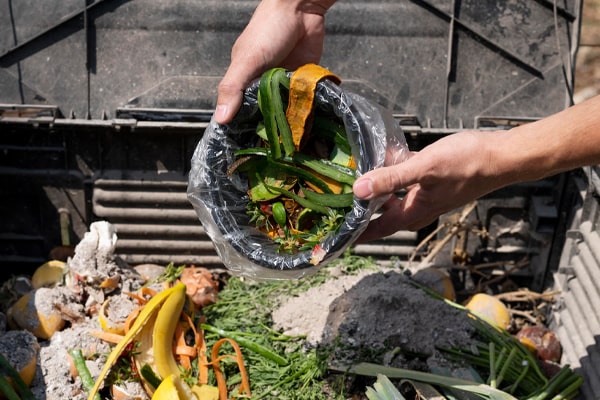You could be using more plastic in the garden than you realize. You are not alone. About two-thirds of plastic waste comes from plastic items with a lifetime of under 5 years, only 9% of plastic waste is recycled, and 50% ends up in landfills.
It’s not easy to go completely plastic free but if you want to make this positive change in your gardening journey, here are some ways to minimize your plastic use:
Contents []
10 Tips to Reduce Plastic Use in the Garden
Grow plants from seed: Did you know that growing plants from seed is more eco-friendly than buying starter plants because you’re not using plastic pots? Garden nurseries use plastic materials for growing seedlings. You are minimizing your carbon footprint by growing your own plants from seed. Instead of plastic pots, you can reuse tetra packs, glass jars, and other biodegradable containers to grow your favorite plants.

Reuse and recycle plastic pots: Plastic pots are the most popular plant containers because they are affordable and cheap to make. But if you reuse or recycle plastic containers instead of throwing them out, you’re doing the planet a lot of good. Clean old, dirty, unused plastic containers, stack them up and use them for future seedlings. Some plant nurseries also accept old plastic pots for reusing and recycling, so if you have more than you can use, turn these over to your local plant nurseries or recycling centers.
Use biodegradable labels: Many types of plant labels are made with plastic. Even some paper-like sticker labels are lined with a plastic film, which makes them hard to recycle (the reason why most recycling centers do not accept plastic-lined paper). Thankfully, there are biodegradable options for plant labels, like wooden plant markers. These markers add a rustic charm to a vegetable or herb garden and are not harmful to the environment. They break down eventually but not quickly, so you can use them for years!
Buy everything in bulk: From natural fertilizer to potting mixes, buy your gardening essentials in bulk. Purchasing gardening supplies in smaller plastic bags means using more plastic materials that could end up in landfills. Buying in bulk minimizes your carbon footprint while also enabling you to save more money on products. We suggest building a shed, so you have somewhere to store your gardening supplies.
Use plastic alternatives: From watering cans to pots and mulching materials, avoid plastic products by seeking alternatives like wood, paper, aluminum, or metal. For example, opt for a metal watering can instead of a plastic watering can or a wooden plant shelf instead of a plastic plant shelf. Alternatives to plastic materials may be pricier, but their positive impact on the environment is priceless!
DIY pest repellent: Instead of spending a small fortune on store-bought pest repellents, make your own using natural ingredients. You can use or reuse a spray bottle to apply the pest repellent or wipe an even layer on the plant leaves. While this tip won’t reduce your plastic use to zero, you are still minimizing your plastic use while being kinder to the critters in your garden.

Try composting: The same goes for fertilizers; instead of buying bag after bag of store-bought fertilizers, you can make it on your own using common kitchen and household waste. Building a compost pit in your backyard allows you to turn kitchen scraps and gardening wastes into natural soil fertilizers such as fallen leaves, eggshells, newspaper, fruit peelings, and vegetable peelings.
Share tools: If you have garden tools that you barely use, share these with your fellow gardeners within your local community to minimize the purchase of plastic products. Some communities have to drop off points for tools that can be borrowed and returned. You can also arrange with your neighbors to borrow and trade garden tools.
DIY weed control: landscape fabric and plastic sheets are often made with recycled plastic, effectively reducing weed growth. A great alternative to landscape fabric and plastic sheets is unused cardboard sheets, pieces of burlap, or old newspapers. These alternatives are biodegradable and widely available.

Invest in plastic-free raised beds: Raised beds made from non-treated wood is an excellent alternative to cheap plastic raised beds. Wooden raised beds are pricier than plastic raised beds, but the enduring quality and beauty are worth the investment. Also, there are reasonably priced wood raised beds that you can buy online; it’s just a matter of finding the right place to shop for these gardening essentials.
Going plastic-free is a big deal, one that will require serious commitment! If you’ve decided to make this positive change in your gardening journey, start by investing in quality gardening tools that are made to last. Shop now and start transforming your living space into a beautiful garden.



